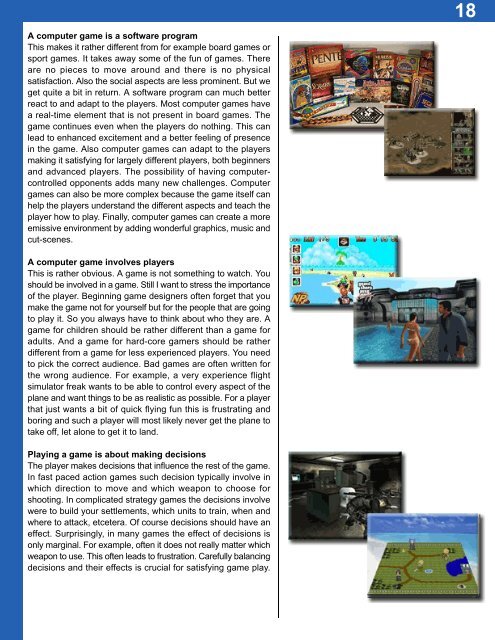You also want an ePaper? Increase the reach of your titles
YUMPU automatically turns print PDFs into web optimized ePapers that Google loves.
A computer game is a software program<br />
This makes it rather different from for example board games or<br />
sport games. It takes away some of the fun of games. There<br />
are no pieces to move around and there is no physical<br />
satisfaction. Also the social aspects are less prominent. But we<br />
get quite a bit in return. A software program can much better<br />
react to and adapt to the players. Most computer games have<br />
a real-time element that is not present in board games. The<br />
game continues even when the players do nothing. This can<br />
lead to enhanced excitement and a better feeling of presence<br />
in the game. Also computer games can adapt to the players<br />
making it satisfying for largely different players, both beginners<br />
and advanced players. The possibility of having computercontrolled<br />
opponents adds many new challenges. Computer<br />
games can also be more complex because the game itself can<br />
help the players understand the different aspects and teach the<br />
player how to play. Finally, computer games can create a more<br />
emissive environment by adding wonderful graphics, music and<br />
cut-scenes.<br />
A computer game involves players<br />
This is rather obvious. A game is not something to watch. You<br />
should be involved in a game. Still I want to stress the importance<br />
of the player. Beginning game designers often forget that you<br />
make the game not for yourself but for the people that are going<br />
to play it. So you always have to think about who they are. A<br />
game for children should be rather different than a game for<br />
adults. And a game for hard-core gamers should be rather<br />
different from a game for less experienced players. You need<br />
to pick the correct audience. Bad games are often written for<br />
the wrong audience. For example, a very experience flight<br />
simulator freak wants to be able to control every aspect of the<br />
plane and want things to be as realistic as possible. For a player<br />
that just wants a bit of quick flying fun this is frustrating and<br />
boring and such a player will most likely never get the plane to<br />
take off, let alone to get it to land.<br />
Playing a game is about making decisions<br />
The player makes decisions that influence the rest of the game.<br />
In fast paced action games such decision typically involve in<br />
which direction to move and which weapon to choose for<br />
shooting. In complicated strategy games the decisions involve<br />
were to build your settlements, which units to train, when and<br />
where to attack, etcetera. Of course decisions should have an<br />
effect. Surprisingly, in many games the effect of decisions is<br />
only marginal. For example, often it does not really matter which<br />
weapon to use. This often leads to frustration. Carefully balancing<br />
decisions and their effects is crucial for satisfying game play.<br />
18


